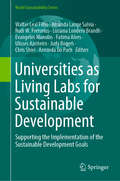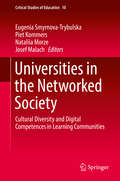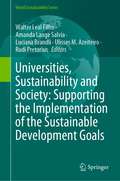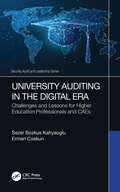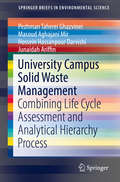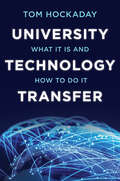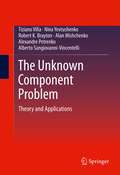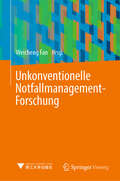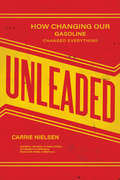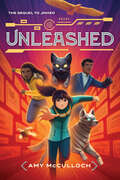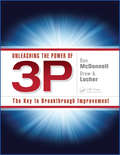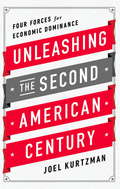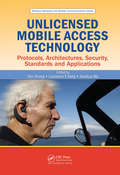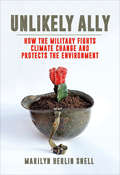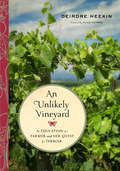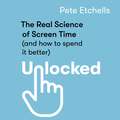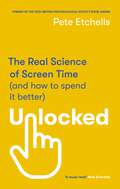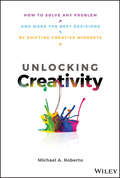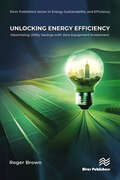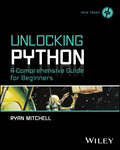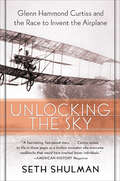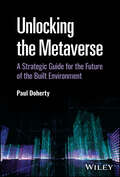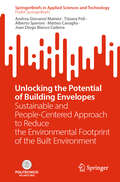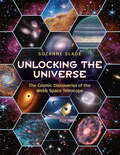- Table View
- List View
Universities as Living Labs for Sustainable Development: Supporting the Implementation of the Sustainable Development Goals (World Sustainability Series)
by Walter Leal Filho Amanda Lange Salvia Rudi W. Pretorius Luciana Londero Brandli Evangelos Manolas Fatima Alves Ulisses Azeiteiro Judy Rogers Chris Shiel Arminda Do PacoThis book fills an important gap in the literature, and presents contributions from scientists and researchers working in the field of sustainable development who have engaged in dynamic approaches to implementing sustainability in higher education. It is widely known that universities are key players in terms of the implementation and further development of sustainability, with some having the potential of acting as “living labs” in this rapidly growing field. Yet there are virtually no publications that explore the living labs concept as it relates to sustainability, and in an integrated manner. The aims of this book, which is an outcome of the “4th World Symposium on Sustainable Development at Universities” (WSSD-U-2018), held in Malaysia in 2018, are as follows: i. to document the experiences of universities from all around the world in curriculum innovation, research, activities and practical projects as they relate to sustainable development at the university level; ii. to disseminate information, ideas and experiences acquired in the execution of projects, including successful initiatives and good practice; iii. to introduce and discuss methodological approaches and projects that seek to integrate the topic of sustainable development in the curricula of universities; and iv. to promote the scalability of existing and future models from universities as living labs for sustainable development. The papers are innovative, cross-cutting and many reflect practice-based experiences, some of which may be replicable elsewhere. Also, this book, prepared by the Inter-University Sustainable Development Research Programme (IUSDRP) and the World Sustainable Development Research and Transfer Centre (WSD-RTC), reinforces the role played by universities as living labs for sustainable development.
Universities in the Networked Society: Cultural Diversity and Digital Competences in Learning Communities (Critical Studies of Education #10)
by Piet Kommers Eugenia Smyrnova-Trybulska Nataliia Morze Josef MalachThis book presents research on the effects and effectiveness of ICT applications in lifelong learning in relation to digital competences of educators. It sketches recent and future evolutions in higher education, explores whether universities have adjusted policies and business models in line with the rapid development of ICT technologies, and analyses whether the adjustments made are merely cosmetic or truly future-proof. The book specifically deals with such topics as digital competencies of teaching staff, the development and implementation of MOOCs and other E-learning tools, virtual classrooms, online tutoring, and collaborative learning. It presents case studies of innovative master’s programmes, projects and methods, and processes of standardization and validation used in various countries as illustrations. The book explains the rapid transition of the knowledge society to the "society of global competence" and shows the necessity of an active implementation of innovative forms and effective methods of education, and above all, distance learning at all levels of education.
Universities, Sustainability and Society: Supporting the Implementation of the Sustainable Development Goals (World Sustainability Series)
by Walter Leal Filho Amanda Lange Salvia Luciana Brandli Ulisses M. Azeiteiro Rudi PretoriusIn order to yield the expected benefits, sustainability initiatives need to be undertaken by means of a close cooperation between universities on the one hand, and societal partners on the others. The principle of co-creation and co-execution of sustainability initiatives increases the value for all by mutual learning, and the sharing of expertise and resources. But pursuing sustainability initiatives with a community and societal involvement is not simple. There is a perceived need for a better understanding of how universities can interact with society, in order to support the implementation of the UN Sustainable Development Goals. This book is an attempt to address this need, by a novel approach which focuses on current potentials and challenges, across a wide range of fields and expertise. The book focuses on how the theory and practice of sustainable development interact and shows the need for a continuation of the dialogue among sustainability academics and practitioners, so as to address the issues, matters and problems at hand. The spectrum of themes addressed on this book also entails how environmental values and ethics are applied and the relationship between social, biological and cultural diversity. It also includes a broad disciplinary approach to sustainability, including education, research and case studies, and the links with human–environment relations in a sustainable development context.
University Auditing in the Digital Era: Challenges and Lessons for Higher Education Professionals and CAEs (Security, Audit and Leadership Series)
by Sezer Bozkus Kahyaoglu Erman CoskunThis book explores how digital transformation is reshaping the manner in which higher education sectors emerge, work, and evolve and how auditors should respond to this challenging and risky digital audit universe in transforming the higher education system. It serves to help professionals to understand the reality of performing the Chief Audit Executive (CAE) role in today’s evolving business economy, specifically in the higher education sector. It compares and contrasts the stated IIA standards with the challenges and realities auditors may face and provides alternative scenarios to gaining a "seat at the table." This book also provides insight into critical lessons learned when executing the CAE role relevant for digitally transforming universities. The main purpose of this study is to rethink the audit culture in the digital era and reveal the key characteristics that are open for improvement so that digitally transforming universities can be audited according to the higher education standards with a digitally supported value-added audit approach. Based on this approach, the audit culture is reassessed considering the digital university conceptual framework and business model. There are two main points to consider for the digital university work environment: traceability and auditability. In this respect, policy recommendations are made for best practices to achieve value-added digital audits in transforming universities. The book has been written from both the reality and academic perspectives of two experienced authors. Sezer is a past CAE, CEO, and long-term senior internal auditor who has worked in the internal audit role for various listed companies, financial institutions, and government entities. Erman has extensive information technology and university accreditation knowledge in the global higher education sector. This brings a blend of value-added approaches to the readers and speaks to issues about understanding and dealing with audit culture and business evolution in digitally transforming organizations along with the requirements for upholding IIA standards. Geared toward the experienced or new CAE, University Auditing in the Digital Era: Challenges and Lessons for Higher Education Professionals and CAEs can be a tool for all auditors to understand some of the challenges, issues, and potential alternative solutions when executing the role of university auditing. In addition, it can be a valuable reference for university administrators and CIOs, as well as academics and all stakeholders related to the higher education sector.
University Campus Solid Waste Management
by Pezhman Taherei Ghazvinei Masoud Aghajani Mir Hossein Hassanpour Darvishi Junaidah AriffinThis volume provides a comprehensive method for optimizing solid waste management practices and procedures at college and university campuses through the use of cluster analysis to combine Life Cycle Assessment and Analytical Hierarchy Process. Author Pezhman Taherei uses Malaysia's University of Malaya as a case study and model, and through this method was able to assess which combination of waste disposal, management, and recycling techniques generate the least environmental impact while retaining the maximum cost savings for the university. A method for analysis of solid waste composition is also proposed. Higher education institutes generate thousands of tons of solid waste per year. Comprehensive solid waste management programs, which take integrated solid waste management systems into consideration, are one of the greatest challenges to achieving campus sustainability. This system can serve as a guide and blueprint for other universities that are taking steps toward sustainability through improved solid waste management.
University Technology Transfer: What It Is and How to Do It
by Tom HockadayDemystifying technology transfer—an increasingly important but little-understood aspect of research universities' mission.How do we transfer the brilliance of university research results into new products, services, and medicines to benefit society? University research is creating the technologies of tomorrow in the fields of medicine, engineering, information technology, robotics, and artificial intelligence. These early-stage technologies need investment from existing and new businesses to benefit society. But how do we connect university research outputs with business and investors?This process, Tom Hockaday explains, is what university technology transfer is all about: identifying, protecting, and marketing university research outputs in order to shift opportunities from the university into business. In this detailed introductory book—a comprehensive overview of and guide to the subject—Hockaday, an internationally recognized technology transfer expert, offers up his insider observations, opinions, and suggestions about university technology transfer. He also explains how to develop, strategically operate, and fund university technology transfer offices while behaving in accordance with the central mission of the university.Aimed at people who work in or with university technology transfer offices, as well as anyone who wants to learn the basics of what is involved, University Technology Transfer speaks to a global audience. Tackling a complex topic in clear language, the book reveals the impressive scale of patenting, licensing, and spin-out company creation while also demonstrating that university technology transfer is a commercial activity with benefits that go well beyond the opportunity to make money.
The Unknown Component Problem
by Alberto Sangiovanni-Vincentelli Alan Mishchenko Alexandre Petrenko Tiziano Villa Robert K. Brayton Nina YevtushenkoThe Problem of the Unknown Component: Theory and Applications addresses the issue of designing a component that, combined with a known part of a system, conforms to an overall specification. The authors tackle this problem by solving abstract equations over a language. The most general solutions are studied when both synchronous and parallel composition operators are used. The abstract equations are specialized to languages associated with important classes of automata used for modeling systems. The book is a blend of theory and practice, which includes a description of a software package with applications to sequential synthesis of finite state machines. Specific topologies interconnecting the components, exact and heuristic techniques, and optimization scenarios are studied. Finally the scope is enlarged to domains like testing, supervisory control, game theory and synthesis for special omega languages. The authors present original results of the authors along with an overview of existing ones.
Unkonventionelle Notfallmanagement-Forschung
by Weicheng FanIn diesem Buch werden vor allem der Forschungsüberblick, die Forschungsergebnisse und die weiteren Perspektiven der "Unconventional Emergency Management Research" vorgestellt, einem großen Forschungsplan der National Natural Science Foundation of China (im Folgenden als Plan bezeichnet). Im Rahmen des Plans wurden innovative Forschungsarbeiten zu wichtigen strategischen Bereichen und Richtungen des Notfallmanagements durchgeführt. Insgesamt wurden 121 Projekte im Rahmen des Plans finanziert, darunter 92 Förderprojekte, 25 Schlüsselprojekte und 4 integrierte Projekte mit einer Gesamtfinanzierung von 120 Millionen RMB. Aus der Perspektive der wichtigsten nationalen Bedürfnisse und der Entwicklung wissenschaftlicher Disziplinen konzentriert sich das Buch auf drei wissenschaftliche Schlüsselthemen: Informationsverarbeitung und Evolutionsmodellierung unkonventioneller Notfälle, Theorie der Entscheidungsfindung in unkonventionellen Notfällen und psychologische und verhaltensbezogene Reaktionsgesetze von Individuen und Gruppen in Notfallsituationen. Die Veröffentlichung dieses Buches zielt darauf ab, die Forschung und Erkundung im Bereich der öffentlichen Sicherheit und des Notfallmanagements stärker zu unterstützen.
Unleaded: How Changing Our Gasoline Changed Everything
by Carrie NielsenWhen leaded gasoline was first developed in the 1920s, medical experts were quick to warn of the public health catastrophes it would cause. Yet government regulators did not heed their advice, and for more than half a century, nearly all cars used leaded gasoline, which contributed to a nationwide epidemic of lead poisoning. By the 1970s, 99.8% of American children had significantly elevated levels of lead in their blood. Unleaded tells the story of how crusading scientists and activists convinced the U.S. government to ban lead additives in gasoline. It also reveals how, for nearly fifty years, scientific experts paid by the oil and mining industries abused their authority to convince the public that leaded gasoline was perfectly harmless. Combining environmental history, sociology, and neuroscience, Carrie Nielsen explores how lead exposure affects the developing brains of children and is linked to social problems including academic failure, teen pregnancies, and violent crime. She also shows how, even after the nationwide outrage over Flint’s polluted water, many poor and minority communities and communities of color across the United States still have dangerously high lead levels. Unleaded vividly depicts the importance of sound science and strong environmental regulations to protect our nation’s most vulnerable populations.
Unleashed (Jinxed #2)
by Amy McCullochThe Golden Compass for the digital age in this action-packed sequel to Jinxed.When Lacey Chu wakes up in a hospital room with no memory of how she got there, she knows something went really wrong. And with her cat baku, Jinx, missing in action and MONCHA, the company behind the invention of the robot pet, threatening her family, she isn't sure who to turn to for answers.When Lacey is expelled and her mom starts acting strangely after the latest update from MONCHA, Lacey and her friends work together to get to the bottom of it and discover a sinister plot at the heart of the corporation.Lacey must use all her skills if she has a chance of stopping MONCHA from carrying out their plans. But can she take on the biggest tech company in North America armed with only a level 1 robot beetle and her friends at her side?Praise for Jinxed:"[A] vividly imagined Toronto-set middle grade series opener intertwines smartphone technology with the hallmarks of classic science fiction via a fun, insightful narrative and bright voice...With a sharp eye toward the rising awareness of device addiction and a keen sense of wonder, McCulloch's tale is a feast for the imagination that celebrates women in STEM fields."—Publishers Weekly (STARRED REVIEW)"McCulloch effectively strikes a balance between worldbuilding and action…A solid series starter for tinkerers and adventurers alike."—Kirkus Reviews"A little bit Golden Compass, a little bit Hunger Games, and all adventure!"—New York Times bestselling author Amie Kaufman
Unleashing the Power of 3P: The Key to Breakthrough Improvement
by Dan McDonnell Drew A. LocherRecent improvements at Enterride‘s Trail Rider Memphis Operation bought Pete Grant, the Trail Rider Plant Manager, and his team a little more time, but Pete knew much more was needed to save the plant. They needed a breakthrough, a true game changer. Then someone told Pete about a process called 3P that could lead to unprecedented improvement when
Unleashing the Second American Century: Four Forces for Economic Dominance
by Joel KurtzmanPolitical gridlock in Washington. . . the lingering effects of the financial crisis. . . structural problems such as unemployment and the skills gap of our work force. . . the mediocre K-12 educational system. Are our best days behind us? Joel Kurtzman persuasively shows why all the talk about America’s decline is not only baseless but dead wrong. Our best days, are, in fact, ahead of us. Four transformational forces-unrivaled manufacturing depth, soaring levels of creativity, massive new energy sources, and gigantic amounts of capital waiting to be invested-have been gathering steam. When combined they will provide the foundation for a much stronger economy, robust growth, and broad-based prosperity that will propel the United States to new heights. One endlessly repeated anxiety is that "we don’t make anything here, anymore. ” The reality, though, is that the US is the world’s dominant manufacturing power-and growing. American companies produce 20 percent of the world’s goods in the US and perhaps another 15 to 20 percent outside our country. And much of what we make is recession-proof-such as software, jetliners, medical devices, pharmaceuticals, chemicals, and food. Kurtzman reveals the stories of the unsung heroes who are the creative force leading the second American century, describing the payoff of the investment in our best minds. American companies have stunning levels of talent and creativity at work in the world’s fastest growing economic sectors-biotech, pharmaceuticals, computer hardware and software, telecommunications, advanced manufacturing, materials science, and aeronautical and space engineering. In these fields, Americans are without peer and consistently break new ground. We are coming to the realization that America is no longer beholden to the despots of foreign energy. Thanks to advances in technology developed in the US, we now have among the world’s largest energy reserves, and are richer in energy resources than Saudi Arabia and second only to Russia. These three strengths-manufacturing, soaring levels of creativity, and energy independence-will be magnified and synergistically combined with the unprecedented amount of capital that now lies idle. US companies of all types are hoarding cash and securities worth more than $4 trillion-an amount larger than the world’s fourth largest economy, Germany. When the money starts flowing and is invested, it will rapidly propel every part of the economy forward.
Unlicensed Mobile Access Technology: Protocols, Architectures, Security, Standards and Applications
by Yan Zhang Laurence T. Yang Jianhua MaThe goal of Unlicensed Mobile Access (UMA) is to provide seamless access to GSM and GPRS mobile service networks via unlicensed spectrum technologies, including Bluetooth, WiMAX, and Wi-Fi. Expanding on the level of knowledge in this growing field, Unlicensed Mobile Access Technology: Protocols, Architectures, Security, Standards, and Applications
Unlikely Ally: How the Military Fights Climate Change and Protects the Environment
by Marilyn SnellIn a curious incongruity, the planet's dominant fighting machine, the US military, has taken on a largely unrecognized yet crucial role in preserving California's cultural and ecological treasures. Recruits learn to spot murder holes and fire assault rifles amid one of the most biologically diverse regions in the world, and researchers look to the desert's flora and fauna for inspiration. Environmental stewardship is law on installations throughout the United States, but a few bases in Southern California have taken a more comprehensive approach-one in which energy security and protection of natural and cultural resources are embedded in the concept of national defense. With journalist Marilyn Berlin Snell as our guide, we explore a culture informed as much by the natural world as by human ideas of leadership.
An Unlikely Vineyard
by Alice Feiring Deirdre HeekinAn Unlikely Vineyard tells the evolutionary story of Deirdre Heekin's farm from overgrown fields to a fertile, productive, and beautiful landscape that melds with its natural environment. Is it possible to capture landscape in a bottle? To express its terroir, its essence of place--geology, geography, climate, and soil--as well as the skill of the winegrower? That's what Heekin and her chef/husband, Caleb Barber, set out to accomplish on their tiny, eight-acre hillside farm and vineyard in Vermont. But An Unlikely Vineyard involves much more. It also presents, through the example of their farming journey and winegrowing endeavors, an impressive amount of information on how to think about almost every aspect of gardening: from composting to trellising; from cider and perry making to growing old garden roses, keeping bees, and raising livestock; from pruning (or not) to dealing naturally with pests and diseases. Challenged by cold winters, wet summers, and other factors, Deirdre and Caleb set about to grow not only a vineyard, but an orchard of heirloom apples, pears, and plums, as well as gardens filled with vegetables, herbs, roses, and wildflowers destined for their own table and for the kitchen of their small restaurant. They wanted to create, or rediscover, a sense of place, and to grow food naturally using the philosophy and techniques gleaned from organic gardening, permaculture, and biodynamic farming. Accompanied throughout by lush photos, this gentle narrative will appeal to anyone who loves food, farms, and living well.
Unlocked: The Real Science of Screen Time (and how to spend it better)
by Pete Etchells'A welcome counterpoint to the technopanic that screen time is causing a mental health crisis' Bruce Hood 'A rare mix of trustworthy science, practical advice, and human stories ... I'm going to recommend it to all the parents I know, and keep it handy for reference next time I see a scary headline about how technology is ruining our lives' Timandra HarknessMost of us spend a significant part of the day in front of a screen. Our work and social lives play out through our computers, tablets and phones: on email, social media, video conference calls and gaming servers. But what is all this screen time doing to our health, our sleep, and our relationships?Professor Pete Etchells studies the way we use screens, and how they can affect us. In UNLOCKED, he delves into the real science behind the panic about our alleged device addiction and withering attention spans. Armed with the latest research, he reveals how little we have to fear, and the great deal we have to gain, by establishing a more positive relationship with our screens. That begins with asking ourselves some essential questions about how we use them.Instead of clamouring for us to ditch our devices (before guiltily returning to the same old habits), UNLOCKED is a sustainable, realistic and vital guide to transforming our connection with technology.
Unlocked: The Real Science of Screen Time (and how to spend it better)
by Pete Etchells'A welcome counterpoint to the technopanic that screen time is causing a mental health crisis' Bruce Hood 'A rare mix of trustworthy science, practical advice, and human stories ... I'm going to recommend it to all the parents I know, and keep it handy for reference next time I see a scary headline about how technology is ruining our lives' Timandra HarknessMost of us spend a significant part of the day in front of a screen. Our work and social lives play out through our computers, tablets and phones: on email, social media, video conference calls and gaming servers. But what is all this screen time doing to our health, our sleep, and our relationships?Professor Pete Etchells studies the way we use screens, and how they can affect us. In UNLOCKED, he delves into the real science behind the panic about our alleged device addiction and withering attention spans. Armed with the latest research, he reveals how little we have to fear, and the great deal we have to gain, by establishing a more positive relationship with our screens. That begins with asking ourselves some essential questions about how we use them.Instead of clamouring for us to ditch our devices (before guiltily returning to the same old habits), UNLOCKED is a sustainable, realistic and vital guide to transforming our connection with technology.
Unlocked: The Real Science of Screen Time (and how to spend it better)
by Pete Etchells'A welcome counterpoint to the technopanic that screen time is causing a mental health crisis' Bruce Hood'A rare mix of trustworthy science, practical advice, and human stories ... I'm going to recommend it to all the parents I know, and keep it handy for reference next time I see a scary headline about how technology is ruining our lives' Timandra Harkness'Punctures some of the most pernicious myths about our smartphone and screen-dominated lives, while offering good advice about how to improve the time we spend with screens ... a must-read' New ScientistMost of us spend a significant part of the day in front of a screen. Our work and social lives play out through our computers, tablets and phones: on email, social media, video conference calls and gaming servers. But what is all this screen time doing to our health, our sleep, and our relationships?Professor Pete Etchells studies the way we use screens, and how they can affect us. In UNLOCKED, he delves into the real science behind the panic about our alleged device addiction and withering attention spans. Armed with the latest research, he reveals how little we have to fear, and the great deal we have to gain, by establishing a more positive relationship with our screens. That begins with asking ourselves some essential questions about how we use them.Instead of clamouring for us to ditch our devices (before guiltily returning to the same old habits), UNLOCKED is a sustainable, realistic and vital guide to transforming our connection with technology.
Unlocking Creativity: How to Solve Any Problem and Make the Best Decisions by Shifting Creative Mindsets
by Michael A. RobertoTear down the obstacles to creative innovation in your organization Unlocking Creativity is an exploration of the creative process and how organizations can clear the way for innovation. In many organizations, creative individuals face stubborn resistance to new ideas. Managers and executives oftentimes reject innovation and unconventional approaches due to misplaced allegiance to the status quo. Questioning established practices or challenging prevailing sentiments is frequently met with stiff resistance. In this climate of stifled creativity and inflexible adherence to conventional wisdom, potentially game-changing ideas are dismissed outright. Senior leaders claim to value creativity, yet often lack the knowledge to provide a creative framework. Unlocking Creativity offers effective methods and real-world examples of how the most successful organizations create cultures of innovation and experimentation. Best-selling author and scholar Michael Roberto presents a thorough investigation of organizational obstacles to creative thought. Highly relevant to the growth crises many enterprises face in today’s economic landscape, this book examines how to break barriers to spark creativity and foster new ideas. This insightful and informative work allows business executives, senior managers, and organization leaders to: Recognize the six organizational mindsets that impede creativity and innovation Learn how to tear down the barriers that obstruct the creative process Create an environment that allows talented people to thrive Encourage creative collaboration in teams throughout an organization Leaders do not have to conceive innovative ideas, but rather open the path for curious and creative employees within their organization. Unlocking Creativity: How to Solve Any Problem and Make the Best Decisions aids organizations in removing obstacles to the creative process and helps to form an atmosphere of imagination and innovation.
Unlocking Energy Efficiency: Maximizing Utility Savings with Zero Equipment Investment (River Publishers Series in Energy Sustainability and Efficiency)
by Roger BrownThis book will reveal cost reductions and how to slash your energy costs without having to invest a lot of money. You don’t need to spend a lot to save a lot! The three pillars of cost reduction are discussed: assembling your options and analyzing your risk, developing options with your utility, and cutting out obvious waste in your operation. Those who will benefit from this exceptional and unique text are business owners, CFOs, plant managers, plant engineers, and energy managers. You will learn how to distill what cost savings are possible and how you can quickly accomplish those savings from what you already know. You can expect to walk away at the end of this book with confidence and a realistic plan of action for reducing your costs.
Unlocking Python: A Comprehensive Guide for Beginners
by Ryan MitchellA fun and practical guide to learning Python with a special focus on data science, web scraping, and web applications In Unlocking Python: A Comprehensive Guide for Beginners, veteran software engineer, educator, and author Ryan Mitchell delivers an intuitive, engaging, and practical roadmap to Python programming. The author walks you through the vocabulary, tools, foundational knowledge, and occasional pop-culture references you'll need to hone your skills with this popular programming language. You'll learn how to install and run Python on your own machine, get up and coding with the language quickly, and best practices for programming both independently and in the workplace. You'll also find: Key concepts in computer and data science explained from the ground up Advanced Python topics such as logging, unit testing, multiprocessing, and interacting with databases. Introductions to some of Python's most popular third-party libraries: Flask, Django, Scrapy, Scikit-Learn, Numpy, and Pandas Amusing anecdotes from the trenches of industry Perfect for tech-savvy professionals at any stage of their careers who are interested in diving into Python programming. Unlocking Python is also a must-read for readers who work in a technical role but are interested in getting more directly involved with programming, as well as non-Python programmers who want to apply their technical skill to a new language.
Unlocking The Sky: Glenn Hammond Curtiss and the Race to Invent the Airplane
by Seth ShulmanUnlocking the Sky tells the extraordinary tale of the race to design, refine, and manufacture a manned flying machine, a race that took place in the air, on the ground, and in the courtrooms of America. While the Wright brothers threw a veil of secrecy over their flying machine, Glenn Hammond Curtiss -- perhaps the greatest aviator and aeronautical inventor of all time -- freely exchanged information with engineers in America and abroad, resulting in his famous airplane, the June Bug, which made the first ever public flight in America. Fiercely jealous, the Wright brothers took to the courts to keep Curtiss and his airplane out of the sky and off the market. Ultimately, however, it was Curtiss's innovations and designs, not the Wright brothers', that served as the model for the modern airplane.
Unlocking the Metaverse: A Strategic Guide for the Future of the Built Environment
by Paul DohertyUnlocking the Metaverse Highly comprehensive resource providing insight into how the “Metaverse,” and digital worlds in general, can be leveraged for business success Unlocking the Metaverse focuses on the strategic implementation of processes and the execution of Metaverse strategies, technologies, and innovations and provides readers with real world tools and strategies to succeed with market demands. The text provides a clear and concise description of what the Metaverse is and what its value means to readers and their companies. A continuous interaction with readers inside the book’s virtual world in the Metaverse provides both structured and unstructured interactions with the highly qualified author and his guests in periodic and ongoing public events, serving as a repository of continuous learning and a sandbox for continuous innovations to be explored, analyzed, and reported. Unlocking the Metaverse covers sample topics such as: Construction documents and drawings, covering building information modeling (BIM), digital twins, virtual worlds, the metaverse, and level of experience/engagement measures Specifications changing role, covering specification manuals, lifecycle, 3D geolocation specs, and 3D search Smart contracts and tokenomics, DLT/blockchain, smart contracts, NFTs/FTs (digital building/digital asset), fractionalized ownership and digital real estate, and CBDCs, stablecoins, and crypto Future outlooks, covering machine learning and artificial intelligence (AI) as a whole, and its probable applications in gaming and robotics Providing authoritative coverage of an important and fast-evolving industry, Unlocking the Metaverse is an essential resource for architects, engineers, and contractors, facility managers and operators, and property owners who want to stay on the cutting edge of new forms of technology and leverage them to increase business success.
Unlocking the Potential of Building Envelopes: Sustainable and People-Centered Approach to Reduce the Environmental Footprint of the Built Environment (SpringerBriefs in Applied Sciences and Technology)
by Andrea Giovanni Mainini Tiziana Poli Alberto Speroni Matteo Cavaglià Juan Diego Blanco CadenaThis book delves into the performance-based design approach, highlighting the necessity for bespoke, adaptive, and cognitive building envelopes that promote sustainable and positive behaviours throughout their lifecycle. A key to unlock the building envelope's potential is the integration of advanced digital tools such as building information modelling (BIM) and digital twin technology, which enable accurate simulation and optimization of energy efficiency, decarbonization, and human-centric design aspects. Moreover, the work emphasizes the importance of a user-centred approach in designing interactive and connected building envelopes, thereby fostering sustainable behaviours among occupants. This focus on user engagement and education in optimizing building envelope utilization not only contributes to reducing the environmental impact but also enhances the quality of life, well-being, and health of occupants. In the era of digital and ecological transition, the book serves as an essential guide to design and operate energy-efficient, responsive, and user-friendly building envelopes, paving the way for a future where the built environment is a significant contributor to sustainability and human health.
Unlocking the Universe: The Cosmic Discoveries of the Webb Space Telescope
by Suzanne SladeA stunning STEM feast on NASA's Webb Telescope--the world's most powerful telescope--will marvel future scientists and engineers about space and the universe beyond.Building the James Webb Space Telescope was no easy feat. It started with a big dream and an even bigger team: thousands of engineers and scientists across the country and world. The team solved design challenges, built prototypes, and ran test after test. They experienced frustration, page-turning suspense, and, ultimately, triumph. After decades of work, a rocket catapulted the Webb Telescope into space. With Webb, we can now see farther than we've ever seen before.The first Webb images, released on July 11, 2022, captivated the world. Today the Webb team continues releasing new images and making astonishing discoveries. This is their story, as told by a mechanical engineer and reviewed for accuracy by key members of the Webb team.
